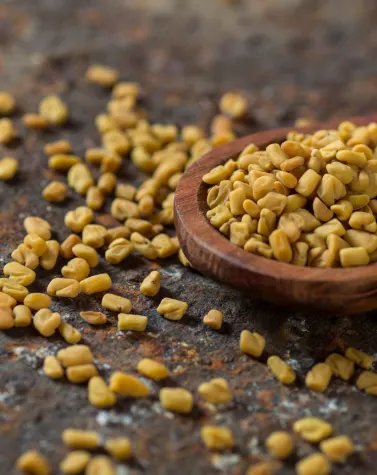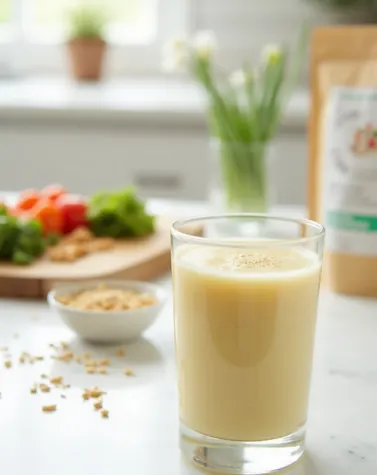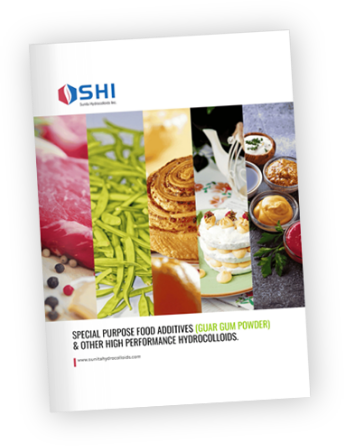
Essential Uses of Guar Gum in Cooking for Delicious Results
Guar gum, also known as guaran, is a natural thickening agent made from the endosperm of guar seeds. It is mainly grown in the regions of India and Pakistan. Guar gum is widely recognized for its high thickening power and ability to enhance texture and stability in a range of foods. From gluten free baking to frozen desserts, guar gum has become an indispensable ingredient for home cooks and food manufacturers alike.
Due to its exceptional binding and emulsifying capabilities, guar gum has found its place as a reliable alternative to other thickeners such as cornstarch and xanthan gum. In addition, it serves as a rich source of soluble dietary fiber, adding nutritional value along with functional benefits.
Benefits of Guar Gum in Cooking
The use of guar gum offers a plethora of benefits such as:
1) High Viscosity at Low Cost
Guar gum thickens food products effectively, even when used at low concentrations. Thus, it is a budget friendly ingredient.
2) Gluten Free
Guar gum is often used as an alternative of gluten. It is good gluten replacement due to its binding capabilities. This makes it ideal for people following a gluten free diet.
3) Improves Digestive Health
Guar gum is a soluble fiber that promotes gut health. It also supports heart health by lowering cholesterol.
4) Versatile Applications
Guar gum has numerous applications in the food industry. It is used in baked goods, sauces, desserts and more to render a smooth, consistent texture across recipes. This versatility makes guar gum a go to for home cooks and food companies.
Using Guar Gum as a Thickening Agent
Guar gum falls among the most potent natural thickeners available in the market. Its small amount is enough to thicken soups, sauces and gravies. Generally, 1/8 to 1/4 teaspoon per cup of liquid is used in the recipes.
Key Tips
- Sprinkle guar gum gradually and mix vigorously so that no lumps are formed.
- Create a thick liquid by adding a small amount of cold water to guar gum before adding it to hot liquids.
- Avoid adding too much guar gum as an excess of it can result in a gummy texture.
Guar gum performs particularly well with gluten free ingredients such as rice flour, almond flour and coconut milk to enhance the texture in baked dishes.
Guar Gum in Gluten-Free Baking
Elasticity in baked goods is typically achieved through wheat gluten. However, for gluten-free baking, gluten free guar gum is an excellent alternative, providing the right structure and texture. This versatile ingredient:
- Adds elasticity and binds the ingredients
- Gets better crumb structure and moisture retention
- Prevents crumbling in cakes, cookies and muffins
Guar gum delivers delicious and structurally sound baked goods for those avoiding gluten. It has popular applications such as:
- Pizza crusts
- Gluten free bread
- Pancakes and muffins
Guar Gum in Frozen Desserts
Guar gum prevents ice crystals from forming in frozen desserts. This ensures a better texture of ice creams and other frozen goods. Thus, guar has wide applications in the frozen dessert industry. It:
- Prevents large ice crystals from forming
- Ensures a creamy, scoopable texture
- Stabilizes emulsions in dairy-free and vegan alternatives
Guar gum ensures the consistency of the frozen dessert during freezing and thawing. It is ice creams, frozen yogurts, non dairy gelatos and sorbets to deliver smooth and indulgent results.
Salad Dressings and Sauces
Guar gum is highly effective in:
- Thickening emulsions (oil and vinegar)
- Stabilizing creamy textures
- Improving mouthfeel in light or low-fat dressings
It’s also ideal for:
- Marinades
- Dips
- Savory gravies
Its cold-water solubility allows it to thicken without cooking, making it perfect for raw or refrigerated dressings.
Food Applications of Guar Gum
Guar gum serves several roles in food preparation as a
- Thickener: It increases the viscosity of soups, batters and sauces
- Stabilizer: It maintains the structure in dairy and plant based products
- Emulsifier: It keeps oil and water based ingredients from separating.
It is widely used in ice creams and yogurts, gluten free recipes and low fat and low calorie formulations. The result is always a smooth, cohesive, and appetizing final product.
How to Use Guar Gum
Here are the steps for using guar gum in your recipes correctly.
- Measure accurately: Start with 1/8 tsp per cup of liquid.
- Pre-mix in cold liquid: Avoid adding directly to hot mixtures.
- Whisk or blend thoroughly: Prevent clumps and ensure even distribution.
- Adjust texture: Add slowly and stir well before increasing dosage.
You can use guar gum in the recipes of the following:
- Smoothies for added fiber and thickness
- Soups for a creamy, hearty texture
- Gluten-free doughs for better structure
Troubleshooting Common Issues
| Issues | Cause | Solution |
| Slimy or stringy texture | Too much guar gum used | Reduce amount by 25–50% |
| Clumping | Added directly to hot liquid | Mix with cold liquid before adding |
| Digestive discomfort | Excess fiber intake or sensitivity | Use sparingly and increase slowly |
| Poor blend with xanthan gum | Ingredient incompatibility | Use one or the other, not both unless tested |
Pro Tip: Store guar gum in an airtight container in a cool, dry place to prevent clumping due to humidity.
Measuring Guar Gum Properly
Because of its potency, accurate measurement of guar gum is key.
- Use digital scales for precision
- Measure in fractions of teaspoons
- Start with less, test results, and adjust upward if needed
Improper measurement can drastically alter a recipe’s texture so always measure carefully and mix properly.
Guar Gum and Gluten-Free Diets
For those avoiding gluten, guar gum is a staple ingredient. It:
- Replaces gluten’s elasticity and binding
- Used in baked goods, gravies, and doughs
- Enhances mouthfeel and texture in gluten-free dishes
Guar gum is especially useful in flour blends when working with almond, rice or sorghum flours to create a balanced mix for various recipes.
Conclusion
Guar gum is more than a thickener—it’s a tool that changes texture, improves stability and supports health conscious cooking. Whether you’re baking gluten free treats, whipping up salad dressings or churning ice cream, guar gum gives you smooth, delicious and consistent results.
When used correctly, guar gum becomes your kitchen ally—adding value, nutrition, and gourmet-quality texture to every dish.





